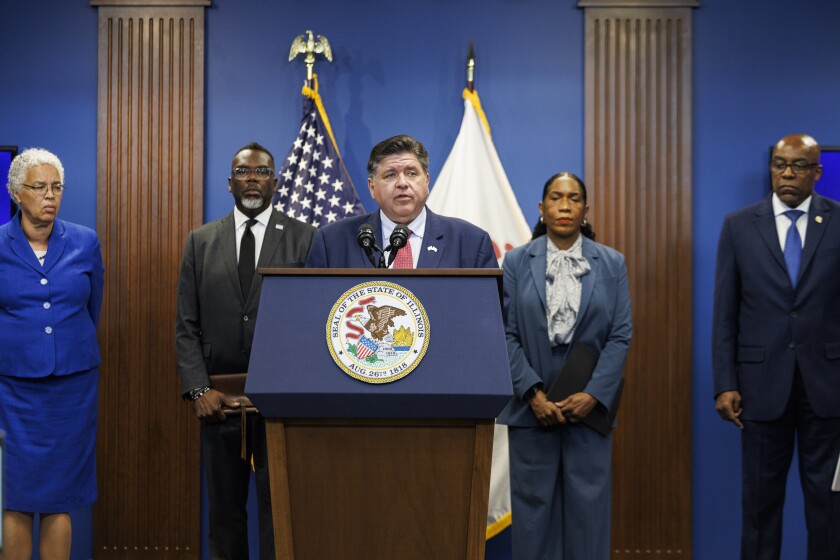Hundreds of federal agents who are being sent to a north suburban naval base this week are expected to leave the facility before dawn each morning to carry out President Donald Trump’s mission to curb crime and make immigration arrests in Chicago, officials have been told.
The 230 agents, at least some of whom work for U.S. Customs and Border Protection, are coming from Los Angeles, where an immigration blitz this summer spurred protests that pushed Trump to call in the National Guard, sources familiar with the planning said.
At least 30 agents already have arrived at Naval Station Great Lakes near North Chicago, where they’ve been practicing crowd control with shields and flash-bang grenades, the sources said. Similar training has been underway for several months.
Once the surge in enforcement begins, reportedly as early as Friday, agents are expected to leave the base by 5 a.m. daily to avoid interrupting normal operations, the sources said.
About 140 unmarked vehicles that will be used in the operation have been sent to the base, which is the Navy’s largest training station and the largest military installation in the state, according to sources. Officials are seeking to establish a no-fly zone to keep away news helicopters and drones that aren’t already prohibited from flying in the area.
The Trump administration got approval Saturday to use Naval Station Great Lakes for the operation. The Chicago Sun-Times first reported that staff at the base were told that it would be used to accommodate federal agents, and potentially National Guard troops, from Tuesday through the end of the month.
“These operations are similar to what occurred in Los Angeles earlier this summer. Same [Department of Homeland Security] team,” Navy Cpt. Stephen Yargosz, the commanding officer of the base, said in an email to his leadership team on August 25, referring to the controversial raids that roiled that city in June.
Federal officials didn’t respond to requests for comment Wednesday. But last week, a DHS spokesperson said officials were being sent to Chicago and Boston to target immigrants.
Trump on Tuesday confirmed that federal authorities were headed to Chicago after he was asked whether he was planning to send the National Guard.
“We’re going in,” Trump said during a news conference in the Oval Office. “I didn’t say when.”
Later Tuesday, Gov. JB Pritzker decried Trump’s crime-fighting promise as a partisan ploy to justify an unnecessary military presence in Chicago. Pritzker noted that Trump’s administration may have already begun staging the Texas National Guard for deployment.
Pritzker said his office believes U.S. Immigration and Customs Enforcement agents are specifically targeting Chicago during this weekend’s Mexican Independence Day festivities.
“It breaks my heart to report that we have been told ICE will try and disrupt community picnics and peaceful parades. The terror and cruelty is the point, not the safety of anyone living here,” Pritzker said, speaking in the Loop alongside Mayor Brandon Johnson, Cook County Board President Toni Preckwinkle and Illinois Attorney General Kwame Raoul.

Gov. JB Pritzker speaks at a downtown press conference Tuesday about President Trump’s plan to send federal agents and the National Guard to Chicago. Joining Pritzker were, from left to right, Cook County Board President Toni Preckwinkle, Mayor Brandon Johnson, Lt. Gov. Juliana Stratton and Attorney General Kwame Raoul.
Anthony Vazquez/Sun-Times
Trump highlighted a surge in gun violence in Chicago over the weekend, framing himself as a savior who can quickly solve an intractable problem. But Pritzker and Johnson have stressed that crime in Chicago has fallen significantly. This summer, the city saw its fewest murders since 1965, according to a WBEZ analysis.
Experts who study Chicago’s crime patterns said Trump’s plan amounts to a political stunt that could be “a recipe for disaster.”
“Just deploying troops to the area is not going to have an impact on violence being up or down, because violence, as it plays out in most places like Chicago, is more interpersonal than planned,” said Lance Williams, a professor at Northeastern Illinois University. “And so troops would not be able to get in front of that type of thing.”
Source link

